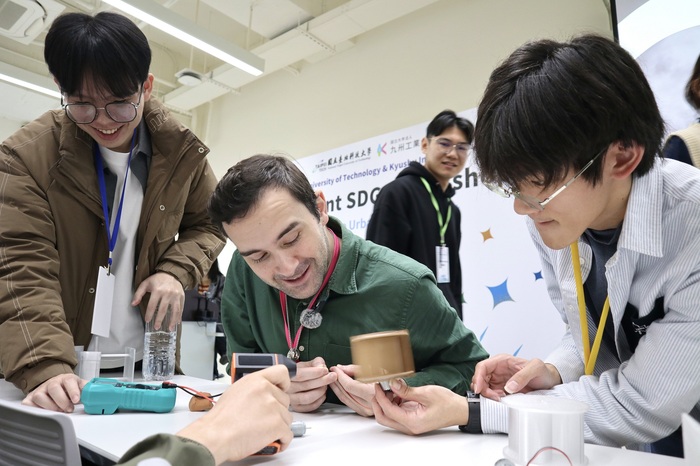Taipei Tech and Kyutech Host 2025 Sustainable Urban Development Workshop Collaboration

Taipei Tech partnered with Japan’s Kyushu Institute of Technology (Kyutech) and organized the 2025 Taipei Tech & Kyutech SDGs Sustainable Urban Development Workshop. The event was co-hosted by Taipei Tech’s Research Center of Energy Conservation for New Generation of Residential, Commercial, and Industrial Sectors (RCEC), Office of Research and Development, and Office of International Affairs. Seventeen students from Kyutech participated in this international workshop held from March 5 to 7, collaborating closely with Taipei Tech students.
Taipei Tech President Wang Sea-fue highlighted the diverse backgrounds of participating students, including mechanical engineering, computer science, electrical engineering, electronics engineering, chemical engineering, materials, architecture, photonics, automation, English, and technical education. Mixed into interdisciplinary teams, students visited urban sites around Taipei, touring the city’s sustainability implementations and brainstorming solutions for real-world issues like renewable energy, sustainable resource management, and social responsibility. This interaction aimed to foster sustainable thinking and practical action among students.
The workshop was led by Assistant Professor Juan Yu-hsuan from Taipei Tech’s Department of Mechanical Engineering, an expert in urban wind energy and sustainable building environments. His team introduced students to vertical-axis wind turbines, a design that’s more suitable for urban environments than traditional horizontal turbines. Participants created their own miniature vertical-axis wind turbines from 3D-printed components. They tested turbine performance directly, generating up to 2,000 volts from simple cardboard structures.
Through this workshop, Juan said that the students not only learned about renewable technologies but also explored practical design solutions tailored specifically for urban environments.
Professor Mito Masaki from Kyutech remarked that their institution, based in Kitakyushu—a city renowned for sustainable development throughout Asia—greatly benefited from sharing expertise with Taipei Tech, which is known for its ecological campus and green technology leadership. He hopes this partnership will continue to nurture students capable to tackle future challenges in sustainable urban development.
Taipei Tech President Wang Sea-fue highlighted the diverse backgrounds of participating students, including mechanical engineering, computer science, electrical engineering, electronics engineering, chemical engineering, materials, architecture, photonics, automation, English, and technical education. Mixed into interdisciplinary teams, students visited urban sites around Taipei, touring the city’s sustainability implementations and brainstorming solutions for real-world issues like renewable energy, sustainable resource management, and social responsibility. This interaction aimed to foster sustainable thinking and practical action among students.
The workshop was led by Assistant Professor Juan Yu-hsuan from Taipei Tech’s Department of Mechanical Engineering, an expert in urban wind energy and sustainable building environments. His team introduced students to vertical-axis wind turbines, a design that’s more suitable for urban environments than traditional horizontal turbines. Participants created their own miniature vertical-axis wind turbines from 3D-printed components. They tested turbine performance directly, generating up to 2,000 volts from simple cardboard structures.
Through this workshop, Juan said that the students not only learned about renewable technologies but also explored practical design solutions tailored specifically for urban environments.
Professor Mito Masaki from Kyutech remarked that their institution, based in Kitakyushu—a city renowned for sustainable development throughout Asia—greatly benefited from sharing expertise with Taipei Tech, which is known for its ecological campus and green technology leadership. He hopes this partnership will continue to nurture students capable to tackle future challenges in sustainable urban development.